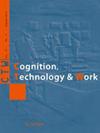Physiotherapists' knowledge, perception, and attitude regarding COVID-19 and infection control: An online cross-sectional survey in Jordan.
IF 3.4
3区 工程技术
Q2 ENGINEERING, INDUSTRIAL
引用次数: 0
Abstract
BACKGROUND The COVID-19 pandemic highlighted the importance of knowledge and awareness of healthcare practitioners regarfing infection control. OBJECTIVE To explore Jordanian physiotherapists' knowledge and perception of COVID-19, awareness about protection measures, and attitude towards infection prevention. METHODS A cross-sectional online survey was used. Data were collected from licensed physiotherapists currently living in Jordan. A structured survey was used to collect the data consisting of five parts: 1) General information about the physiotherapists including sociodemographic, academic training, and employment setting, 2) General knowledge about COVID-19, 3) Infection protection in the workplace, 4) Perception of COVID-19, 5) Attitude towards COVID-19 in daily life and during work. RESULTS A total of 147 physiotherapists completed the survey with a mean age of 30.56 (7.70) and years of experience of 7.28 (7.21). The mean of the total knowledge score was 17.18 (2.32)/ 26. There was a significant difference in the total knowledge score between COVID-19 trained physiotherapists and untrained (t = 2.895, p = 0.004). About 70.8% of the physiotherapists perceived COVID-19 as a very dangerous disease, 69.4% considered physiotherapy a high-risk profession, and 41% perceived COVID-19 does not require any special treatment. Approximately 85% of physiotherapists avoided going to crowded places and wore a mask when leaving home. 75-86.6% of physiotherapists would consider appropriate protective measures during their work. CONCLUSIONS Physiotherapists showed suboptimal Knowledge, perception, and attitude towards COVID-19. There is a need for training courses to increase physiotherapists' knowledge about COVID-19 and improve their perception and attitude towards COVID-19.物理治疗师对COVID-19和感染控制的知识、感知和态度:约旦的一项在线横断面调查
2019冠状病毒病大流行凸显了医护人员在感染控制方面的知识和意识的重要性。目的了解约旦物理治疗师对新型冠状病毒肺炎(COVID-19)的知识和认知、防护措施意识以及对感染预防的态度。方法采用横断面在线调查方法。数据是从目前居住在约旦的有执照的物理治疗师那里收集的。采用结构化调查的方式收集数据,包括五部分:1)物理治疗师的一般情况,包括社会人口统计、学术培训和就业环境;2)对COVID-19的一般知识;3)工作场所感染防护;4)对COVID-19的认知;5)日常生活和工作中对COVID-19的态度。结果共147名物理治疗师完成调查,平均年龄30.56岁(7.70岁),平均工作年限7.28岁(7.21岁)。总知识得分均值为17.18(2.32)/ 26。接受过培训的物理治疗师与未接受过培训的物理治疗师对新冠肺炎的总知识得分差异有统计学意义(t = 2.895, p = 0.004)。约70.8%的物理治疗师认为新冠肺炎是非常危险的疾病,69.4%的物理治疗师认为新冠肺炎是高危职业,41%的物理治疗师认为新冠肺炎不需要任何特殊治疗。约85%的物理治疗师避免前往人群密集的地方,出门时戴口罩。75%至86.6%的物理治疗师会在工作中考虑适当的防护措施。结论物理治疗师对COVID-19的知识、认知和态度不佳。有必要开设培训课程,增加物理治疗师对COVID-19的知识,改善他们对COVID-19的认知和态度。
本文章由计算机程序翻译,如有差异,请以英文原文为准。
求助全文
约1分钟内获得全文
求助全文
来源期刊

Cognition Technology & Work
ENGINEERING, INDUSTRIAL-
CiteScore
6.90
自引率
7.70%
发文量
26
审稿时长
>12 weeks
期刊介绍:
Cognition, Technology & Work focuses on the practical issues of human interaction with technology within the context of work and, in particular, how human cognition affects, and is affected by, work and working conditions.
The aim is to publish research that normally resides on the borderline between people, technology, and organisations. Including how people use information technology, how experience and expertise develop through work, and how incidents and accidents are due to the interaction between individual, technical and organisational factors.
The target is thus the study of people at work from a cognitive systems engineering and socio-technical systems perspective.
The most relevant working contexts of interest to CTW are those where the impact of modern technologies on people at work is particularly important for the users involved as well as for the effects on the environment and plants. Modern society has come to depend on the safe and efficient functioning of a multitude of technological systems as diverse as industrial production, transportation, communication, supply of energy, information and materials, health and finance.
 求助内容:
求助内容: 应助结果提醒方式:
应助结果提醒方式:


